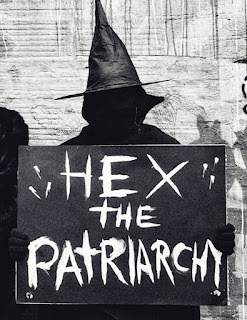If you've not between following WitchTok or witchcraft boards on Reddit there's been a big hullabaloo about witches hexing the Taliban given their recent takeover of Afghanistan. This has created much comment from within the witchcraft community and some trolling from outside.
A related bit of drama from within this same conversation has been incidences of witches attempting to hex not just the Taliban but also Allah.
You might find this topic bizarre, but it's a great illustration of two things. The first is a big point I make in Hunting Magic Eels regarding the contrast between pagan and Christian enchantments. The second goes to a point I made yesterday.
Borrowing from Steven Smith's analysis from Christians and Pagans in the City, the point I make in Hunting Magic Eels is the contrast between immanent versus transcendent enchantment. As Smith argues, the difference between paganism and Christianity is the location of the sacred. In paganism the sacred is located within creation, an immanent enchantment that sees creation as being filled with metaphysical powers, energies, and potencies. Christian metaphysics, by contrast, locates the sacred beyond creation, a transcendent enchantment. (Though we should note that this contrast isn't wholly accurate as Christians believe God is both immanent and transcendent.)
Another way of describing the transcendence of God, familiar now to my regular readers, is to say that God's being and existence is unlike created being and existence. God, as Being Itself, cannot be located among created beings, found among the furniture of the universe. Or, as Thomas Aquinas would say, God does not belong to any genus.
To illustrate St. Thomas' point, I have a witchcraft book on my shelf that has a table in it listing various gods and goddesses that one could appeal to in casting spells. For example, in this table are listed the gods and goddesses Ganash (Indian), Damballah (Haitian), Isis (Egyptian), Brigid (Celtic), and Odin (Norse). These divinities are members of the genus "gods and goddesses." It's this membership that makes a gods and goddess listing in a table possible.
God, by contrast, is not a member of any genus. God cannot be listed under any category of being. God doesn't exist like Odin or Isis. God cannot be found in a table of gods and goddesses. God is what gives gods and goddess their existence.
A still further way to say the same thing is that God creates ex nihilo ("from nothing"). And crucial here is the point that creation ex nihilo isn't some moment in the past, like the Big Bang, when the universe "began." Creation ex nihilo isn't an isolated historical event, it is constant and ongoing, God holding creation continuously in being. Creation ex nihilo is why there is something, right here and right now, rather than nothing. Creation is inherently contingent and, thus, constantly requires the sustaining attention of God. In God we live, move, and have our being.
Which brings us back to hexing Allah. Sharing as they do the same Abrahamic faith with Jews and Christians, Muslims also believe God creates ex nihilo. Consequently, a witch who tries to hex Allah is displaying a metaphysical confusion. A witch hexing Allah is making a category error. For you can only hex a being that exists within the created order. The hex has to be within the same order of being as the object being hexed. Phrased differently, you cannot hex the Being that makes hexes exist in the first place. Hexes and God operate at different orders of being. But even that sentence is an error as God cannot be a member of the genus "order of being." God is what causes orders of being to exist.
You get the point.
All that to say, the whole hexing Allah drama is an interesting case study in the difference between pagan and Christian metaphysics, between immanent and transcendent enchantments. And if this seems to be a pointless academic distinction read Hunting Magic Eels to find out how this distinction affects your life and happiness. Your joy hangs in the balance.
Which brings me to my second point, made in yesterday's post.
Specifically, yes, witches trying to hex Allah display a lack of metaphysical sophistication. They don't understand God. Fine. But remember the point from yesterday's post: Witchcraft is more about political resistance than religious observance. Hexing Allah and the Taliban isn't really about metaphysics. It's about saying "f**k you" to the patriarchy espoused by the Taliban, in how they view and treat women. Hexing the Taliban, Allah specifically, may be metaphysically confused and nonsensical, but it is an admirable act of resistance and solidarity on behalf of the woman of Afghanistan.


